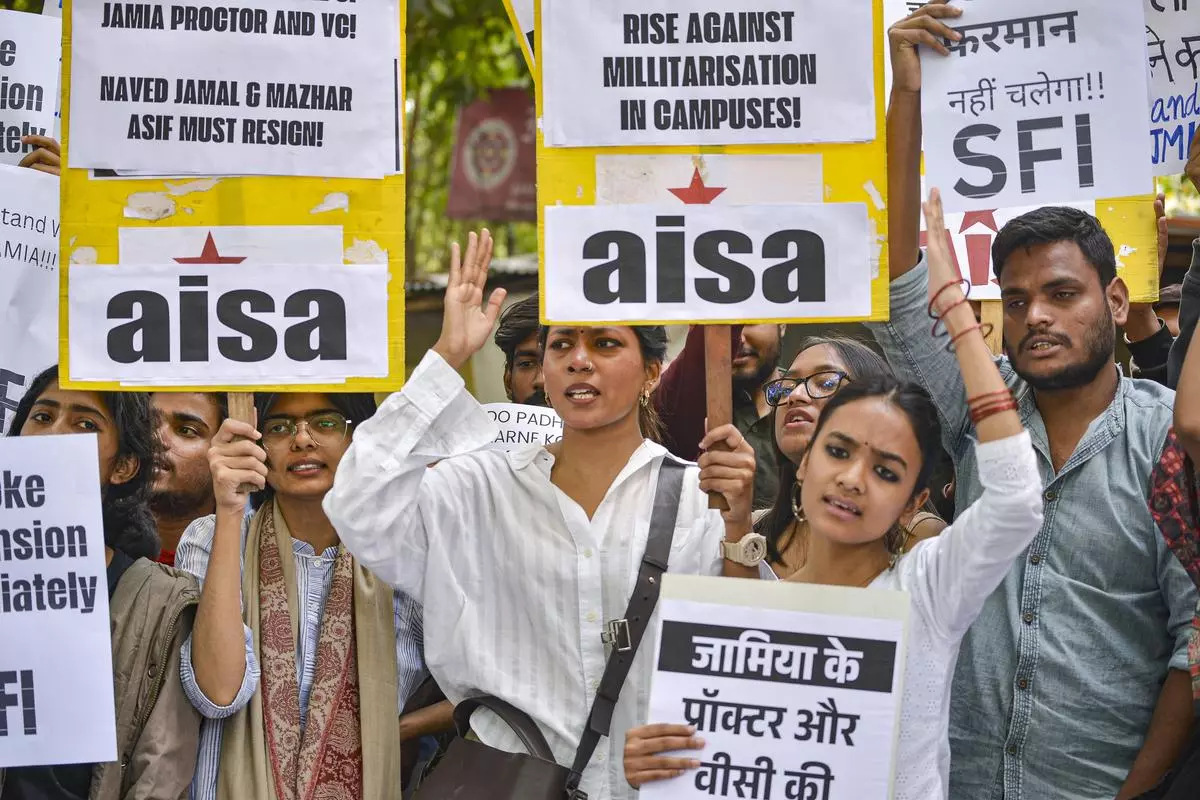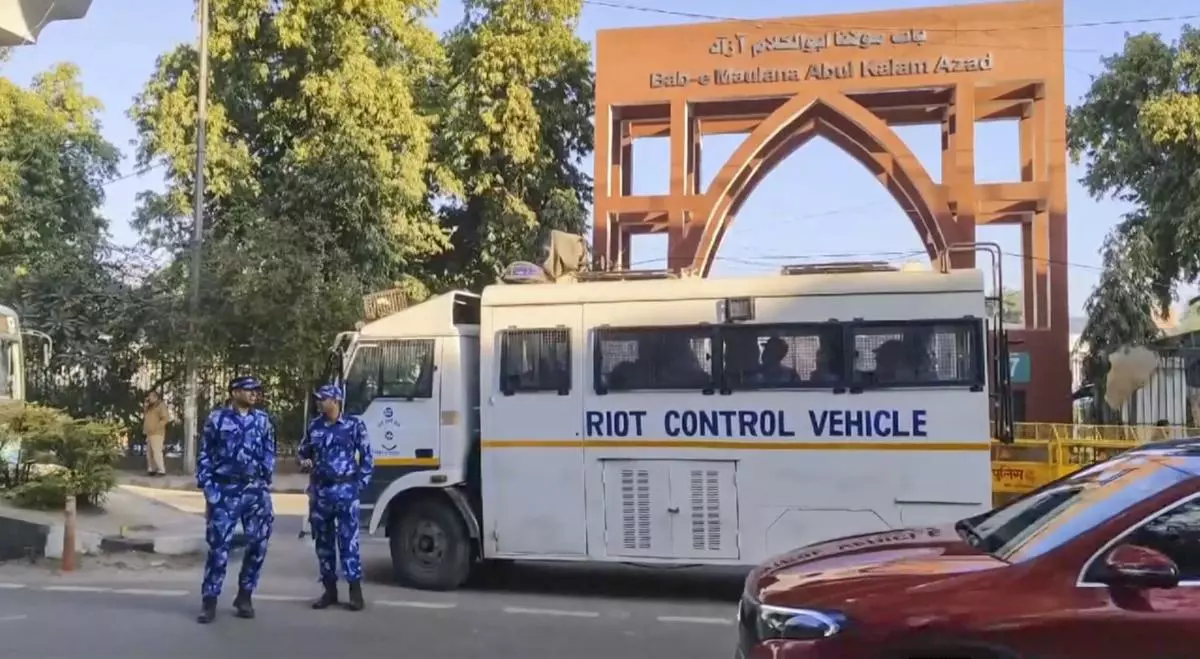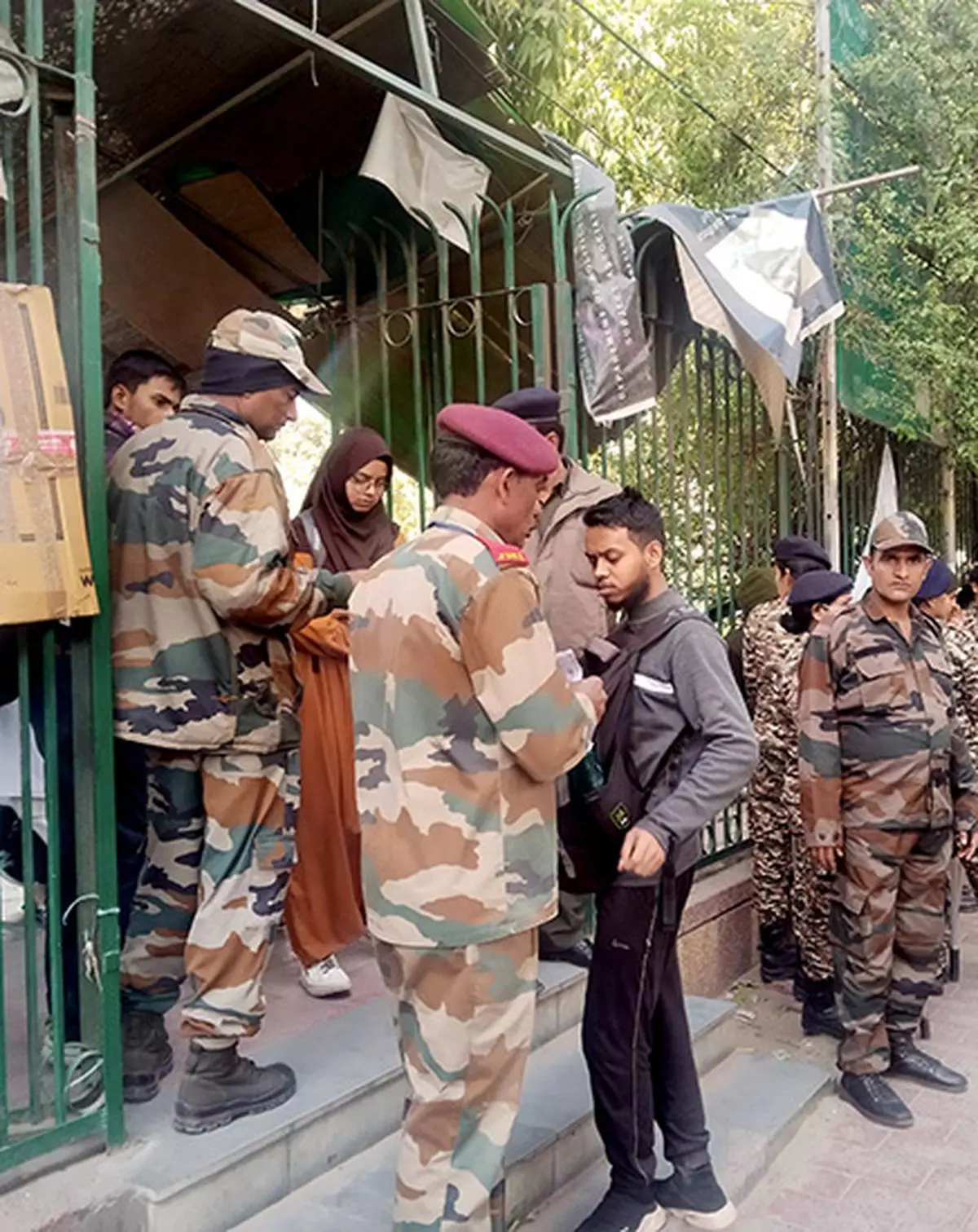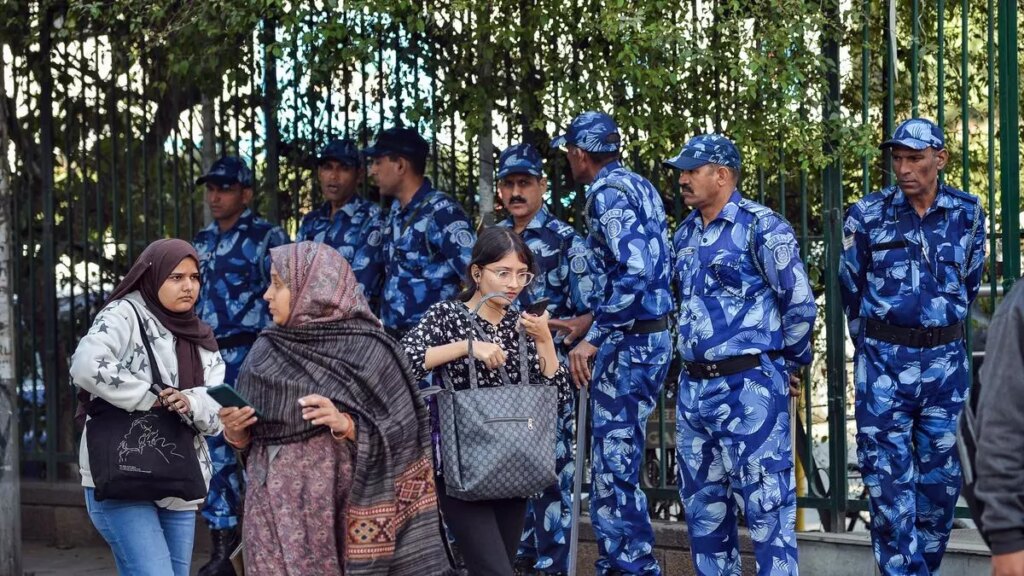Jamia Millia Islamia students have accused the university administration of clamping down on peaceful protests on campus after 14 students were detained by the police on February 13. The students were agitating against the administration over show-cause notices issued to four of them for organising a demonstration on December 15, 2024, the fifth anniversary of police violence against students.
The university has suspended 17 students.
“This is an experiment to clamp down on the voice of reason, the voice of anti-fascism, the voice of democracy,” said Callistine, a master’s student at Jamia Millia Islamia. “If they could completely erase Jamia’s history of dissent, they would. But that’s not easy. So they’re doing everything else; they’re taking over the institution.”
Jamia Millia Islamia has a long legacy of student activism. Established in 1920 as part of the Non-cooperation Movement led by Mahatma Gandhi, the university was born out of the anti-colonial struggle against British-controlled education. Its commitment to social justice and resistance has continued through the decades, from the anti-Emergency protests of the 1970s to the “Pinjra Tod [Break the Cage]” movement in 2015, where female students challenged restrictive hostel curfews and policies. In recent years, Jamia was also at the forefront of the protests against the Citizenship Amendment Act (CAA) and the National Register of Citizens (NRC) in 2019. The brutal police crackdown on students on December 15, 2019—in which students were assaulted inside their campus and library—is a defining moment in its contemporary history.
Also Read | Suspensions, surveillance, and silencing: Understanding the student crackdown at Jamia Millia
Since then, students have observed December 15 as “Remembrance Day” each year, gathering in groups to express solidarity through speeches and poetry—until now. In December 2024, for the first time, the administration denied students permission to hold the event, shutting down the campus under the pretext of maintenance work. When students proceeded with the protest the following day, four of them received show-cause notices.
In response, the students submitted a 16-page reply to the administration on December 20, which was deemed “unsatisfactory”. A disciplinary committee was then formed on February 3 to take action against Saurabh, a PhD scholar of the Hindi department. On February 9, another PhD student, Jyoti, along with two other students, received notices informing them that a disciplinary committee had been formed against them. “We called for a sit-in protest demanding that no disciplinary committee should be there, as we had done nothing wrong,” said Sajahan, a first-year master’s student of sociology and one of the 17 students suspended.
“Just before the sit-in, on February 9, Jyoti received a notice. So, the sit-in became even more necessary.” The protest began on February 10 in front of Jamia’s central canteen, demanding that the disciplinary action against students targeted for organising the Remembrance Day event be revoked.
Criminalising dissent
Callistine explained how the administration used recent office memorandums to justify the crackdown. “There are administrative rules banning protests, postering, and graffiti, even explicitly stating that slogans against constitutional authorities are not allowed. These quasi-legal documents, issued just three months ago, are now being used to target students. What does ‘no slogans against constitutional authorities’ even mean in a university space? It’s so vague–it essentially criminalises dissent.”
A memorandum dated November 26, 2024, stated that “no protests, dharnas, raising slogans against any constitutional dignitaries shall be allowed in any part of the university campus, otherwise disciplinary action against such erring students shall be initiated.” Another notice released by the Property Department of the university on December 20, 2024, prohibited writing slogans or posting posters on campus without permission, introducing a fine of Rs.20,000 and legal action on anyone doing so. The notice also mentioned that “the University is increasing vigilance across the campus with additional monitoring by security personnel and CCTV cameras.”
As the sit-in continued, a notice dated February 11 accused students of disrupting academics and forcing the closure of the canteen. “But it was the administration that shut the canteen and nearby washrooms, not us,” Callistine pointed out. “It was a strategic move to make other students turn against the protest.”

Members of various student organisations along with the suspended students of Jamia Millia Islamia university stage a protest against the Proctor and Vice Chancellor, at Jantar Mantar in New Delhi on February 19, 2025.
| Photo Credit:
PTI
On February 12, the second day of the protest, students’ families began receiving calls from the police. “My father got calls from the Jamia Nagar police station,” said Sajahan. “They told him that if I didn’t leave campus, my degree would be cancelled, an FIR would be filed against me, and I’d be in serious trouble.” Similar calls were made to the parents of other students, warning them to pull their children out of the protest.
“My father was really scared. He told me that you are Muslim in a place where both governments are now BJP. I kept telling them that ‘Jamia is safe, it is the only place where I feel the most safe’. But then this happened,” said Sajahan.
Later that night, at 12:12 am on February 13, Sajahan and around 10 other student protesters received suspension letters from the office of the chief proctor while they were at the indefinite sit-in outside the university’s central canteen. The letter stated, “You are suspended with immediate effect due to your acts of vandalism, unauthorised and unlawful protest(s), and defamation of the university.” It also cited provisions of the Bharatiya Nyay Sanhita, including those related to mischief causing damage to property, unlawful assembly, and defamation. However, the letter does not specify the duration of the suspension, leaving students uncertain about their academic future.
In the early hours of February 13, around 5 am, security guards, accompanied by Delhi Police officers, surrounded the protest site. According to students, the authorities cornered them while they were asleep. “They grabbed us, picked us up and handed us over to the police. They didn’t even use the main gate; they took us through a side gate,” said Sajahan. “Right outside the gate, there were nearly 200-300 police officers while inside the campus, around 80-90 security guards had been deployed to detain just 10 students.”
Intimidation using police
The students alleged that they were not given any prior warning or formal notice of detention. “There was a vague notice issued a couple of days earlier stating that some students were illegally occupying the area but that did not mention any specific action,” one student said.
Despite the presence of female students, male security guards forcibly detained them. “They completely disregarded all protocols meant to ensure the safety and dignity of women. When we protested, they deliberately mixed male and female detainees in the police buses,” Uthara, a first-year sociology master’s student, told Frontline.
The detained students were taken to three different stations: Kalkaji, Badarpur, and Bawana. “When our peers gathered outside Kalkaji police station with our lawyers, they shifted us from the back door to Fatehpur Beri police station without any prior notice to our family or lawyers. I am from Bengal and do not speak Hindi, but was given three Hindi forms to sign, even after repeatedly requesting English ones,” said Sajahan. The students were detained until 4 pm.
Uthara criticised the systemic flaws in the university administration’s decision. “Our suspension letters accuse us of various charges, yet there is no concrete evidence to support them. This is a targeted crackdown on students who dare to dissent.”

Security personnel deployed outside the Jamia Millia Islamia University in the view of students’ protest, in New Delhi on February 13, 2025.
| Photo Credit:
PTI
Doxxing its own students
On February 14, the day after the detention, the personal details of detained and suspended students were brazenly displayed in front of gate numbers. 7, 8, and 13—an outright violation of their right to privacy. Posters bearing their names, photographs, academic departments, and personal contact information were put up across campus. The administration, over social media posts, has denied any official involvement in the act.
“Taking a strong view of making public the photos and other details of the suspended students, the university administration has constituted a committee to investigate the matter, determine the facts and identify the miscreants, individuals, or organisations involved and will take appropriate action against them,” the university administration said in a Facebook post on February 15.
“There is a video of the guards removing those posters. We learned from our friends that the guards were even checking the ID cards of other students, scrutinising who was passing by,” Callistine said.
Students at Jamia have stood in solidarity with those who were suspended and detained. Various departments across the university have issued collective statements expressing their support. Sanam Hussain, a PhD scholar and secretary of the Jamia unit of the Students’ Federation of India (SFI), the students’ outfit affiliated with the CPI(M), explained how students have repeatedly attempted to engage in dialogue with the administration, only to be ignored. “We submitted a memorandum signed by around 500 students. The administration initially refused to engage, and the proctorial staff hesitated to accept it. After an hour of discussion, they took it but gave no acknowledgement.”
The memorandum submitted to the Dean of Student Welfare (DSW) gave the administration 48 hours to “revoke the suspension notices and disciplinary actions against the students” and “withdraw the oppressive office memorandum issued in August 2022 and other related orders that stifle students’ rights to organise and express themselves”.
The 2022 memorandum, issued by the Jamia Millia Islamia Proctor, stated that “no meetings/gatherings of students shall be allowed in any part of the campus without prior permission of the proctor, failing which disciplinary actions shall be taken against erring students”. Sanam added, “That deadline has passed, yet we have heard nothing.”
Stifling solidarity
Students say that there is an effort to stifle expressions of solidarity with those suspended. Yet, students from nearly 80 departments have voiced their concerns. “Students are beginning to realise that this isn’t just about 17 individuals—it could happen to anyone,” Sanam said.
Despite several warnings from the administration, the university saw mass participation in a class boycott on February 17, leaving classrooms empty. Following this, a public gathering was organised at Jantar Mantar on February 19, which saw participation from students, civil society, professors, and activists to demand the restoration of democratic rights on campus.

Security personnel check a student’s ID amid tight security outside Jamia Millia Islamia after several students were detained by Delhi Police in the early hours of February 13 for protesting against the university’s disciplinary action against two PhD scholars.
| Photo Credit:
PTI
On February 20, the students organised a cultural event, “Shaam-e-Inquilab”, to display solidarity with the suspended students through revolutionary shayaris, songs, and performances. However, the event was conducted under heavy surveillance. “We are reading Ghalib’s poetry. There is a statue of Ghalib at Gate 7. And we are not allowed to recite Ghalib?” Callistine asked.
Despite repeated attempts by the suspended students to seek clarity on their status, the administration has remained largely unresponsive. “We three students are from the same department. We mailed our head of the department and they said that whatever we have to convey should be directed to the disciplinary committee (DC). But the issue is that there is no DC above us,” said Sajahan.
Frontline reached out to the Vice Chancellor, the DSW, and the Chief Media Coordinator for their comments. However, no response was received.
Private support only from professors
The faculty has largely remained silent, maintaining a deliberate distance from the issue. Despite the gravity of the situation, no professor or administrative figure has publicly addressed the matter, leaving students to navigate the crisis on their own. “However, in private conversations, some acknowledge that what has happened is unjust. A key issue is the absence of a teachers’ association at Jamia. The administration repeatedly cites an office memorandum that effectively bans all democratic student activities on campus—a directive issued in 2022. Notably, this was the same period when the Jamia Teachers’ Association (JTA) was dismantled, leaving both students and faculty without a formal platform for collective representation,” Sanam explained.
The JTA was dissolved by former Vice Chancellor Najma Akhtar in November 2022 over alleged procedural lapses. Former JTA president Majid Jamil challenged the decision in the Delhi High Court, which directed the university to submit a committee report examining the association’s constitution. The case is pending in the court.
Frontline tried contacting professors at Jamia but did not receive a response.
Jamia remains the only central university in Delhi without an elected students’ union or a functional teachers’ association. Student union elections at Jamia have not been held for nearly two decades, the last having been conducted in 2006, after which the administration disbanded the union for alleged interference with university matters. The absence of a student body has stifled student representation and is widely seen as a part of a broader effort to depoliticise the campus. “If we go to courts for student elections, they say approach the administration. If we go to the administration, they say go to court. It’s a vicious circle,” Uthara remarked.
The suspension of elections at Jamia, a minority institution, effectively curtails the political participation of Muslim students. “Student elections in a minority institution foster political engagement within that community. Without a union, Muslim students lose a crucial platform for mobilisation and assertions. Political parties seeking to nurture Muslim leaders find no entry point at Jamia, blocking their path to national leadership. This deliberate silencing of student and minority voices aligns with the administration’s broader agenda,” said Callistine.
This suppression extends beyond political expression—it directly affects students’ ability to demand even basic necessities. “Anyone who speaks up risks punishment,” Sanam asserted. Students face consequences for raising concerns about living conditions, unexpected fee payments, and infrastructure issues. Those who complained about hostel conditions were evicted. Without channels for negotiation, students fear that disciplinary action now will silence future dissent, but remain committed to their demands., noted Sanam.
Student groups like SFI have also raised concerns over the rising hostel and course fees, inaccessible libraries, and deteriorating infrastructure.
Militarising campuses
The increasing police presence on the campus has only intensified these worries. Riot control vehicles and heavy policing have become the norm, said students. “You can trace what happens in the country by the number of guards outside Jamia,” Callistine said. “One day before the CAA was notified, the campus was flooded with security. At first, we thought it was for Eid, but then we realised it was also because of the CAA.”
Another student said, “The Jamia we came for was about protest, dissent, democracy, learning, faculty, and environment. That’s what makes Jamia what it is. Now, dissent and democracy are being choked to the extreme. I’ve normalised it to the point where I walk past riot vans without a second thought. The campus feels like a militarised zone.”
Also Read | Should teachers share their political opinions with students?
Constant clampdowns on any voice of dissent have emerged as part of a wider trend in both public and private universities across the country. Speaking to Frontline, JNU Student Union President Dhananjay explained that universities have been systematically targeted since 2014, with JNU being among the first to see fund cuts in 2016. “JNU has always faced criticism for its protests but now even other universities like Jamia are facing these problems where arbitrary memorandums ban protests, sloganeering, and sit-ins. In Banaras Hindu University [BHU] last year, a rape case caused a major outcry. Those who raised their voices were later arbitrarily suspended. These are the things happening in central universities,” he said.
“Earlier we used to think private universities didn’t protest but now students of Ashoka and Jindal universities are also raising their voices against the administration. They are demanding the same inclusive environments that some central universities have,” Dhananjay added, referring to the week-long protests that took place at Ashoka University in January against new policies of enhanced surveillance by the university administration.
Students plan to submit a petition to the Delhi High Court in the coming week, challenging their suspensions. A disciplinary committee hearing for five of the suspended students is scheduled for February 25. While some students are considering legal action, others remain uncertain about their academic future.
Source:https://frontline.thehindu.com/the-nation/education/jamia-millia-islamia-student-protests-clampdown/article69261225.ece

